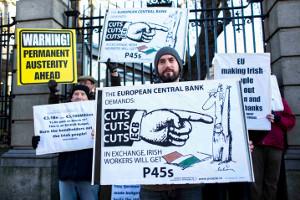Business gives budget a premature welcome

This month's budget received perhaps the warmest welcome from business of any of the six austerity budgets we have endured since October 2008. However the welcome may well prove to be premature. Dan White reports
18 December 2012
IBEC, the organisation which represents large employers, welcomed the government not increasing employment costs "significantly" in the budget. The body also applauded the budget measures designed to tackle unemployment, increase lending to SMEs and allow workers access to AVC pension contributions.
However, IBEC boss Danny McCoy reserved his warmest praise for the government’s decision to heed the lobbying of business groups such as his own and not to introduce a statutory sick pay scheme. To have done so "would have pushed struggling firms out of business and cost jobs", he claimed.
Mark Fielding, the boss of small business organisation ISME, who can normally be relied upon to be a trenchant critic of the government’s economic policies, was if anything even more fulsome in his praise for the budget.
"This budget, while necessarily harsh, has taken the first steps to kick-start the economy", he said.
But has it? While the budget contained very little that will directly affect business, the knock-on impact of some of its measures on business could be very severe.
Property tax
First there is the property tax. Although flagged as far back as the November 2010 bailout, its likely impact on the housing market and consumer sentiment is still unclear. Even a house worth the national average of about €180,000 will be liable for an annual property tax bill of €315.
And that’s barely the half of it. The changes in PRSI, with the abolition of the PAYE workers allowance, mean that most employees will find themselves paying an extra €264 per year. For a married couple where both parties have a job the hit rises to €528.
Throw in higher motor tax, reduced child benefit – €240 per year for a family with two children – along with increased excise duties and the average middle-income family is looking at a reduction in its annual post-tax income of well over €1,000. Though we may not have realised it at the time our pockets have been well and truly picked.
To make back that lost income most of us would have to boost our pre-tax incomes by well over €2,000 a year. Much easier said than done in these recessionary times.
The notion that you can take so much money out of people’s pockets without seriously hitting the domestic economy strikes me as being fanciful. It will be interesting to see the first sets of post-budget retail sales and consumer confidence indices, both of which had risen slightly in the second half of 2012, to see what impact the budget has had.
If past experience is any guide we will see a further contraction in non-motor retail sales, which are already down by almost a quarter from their 2007 peak.

Minister for Finance, Micheal Noonan presents Budget 2013 on 5 December at Government Buildings
Off-licence tax
One retail sector which won’t have to wait to see the impact of the budget is the off-licence trade. Though it wasn’t described as such, the €1 increase in the excise duty on a bottle of wine is best characterised as an "off-licence tax". With the vast bulk of wine sales going through the off-trade rather than the politically better-connected pubs, the 40% increase in wine duty was specifically targeted at the offies.
Not surprisingly the National Off-Licence Association (NOffLA) was one of the few business organisations not to give the budget a warm welcome.
"This is a disappointing and irresponsible decision that will do nothing more than drive out of state retailing", commented NOffLA chairperson Evelyn Jones.
While the pubs, which sell very little wine, can comfort themselves with having escaped with an excise duty increase of "only" ten cent for a pint a beer and ten cent on a standard measure of spirits, they too will feel the backdraft from the budget sooner rather than later.
However, it is the property tax and the PRSI increase which will almost certainly end up inflicting the most severe damage.
Consequences to be felt
With, depending on whose figures you believe, house prices having already fallen by between 50% and over 60% from their 2007 peak, this is absolutely the worst time to be introducing a new property tax. Even those of us who support the principle of a property tax, must be fearful of the consequences of doing so now.
While the 0.18% rate was at the lower end of expectations, anyone expecting it to stay at that rate is likely to be disappointed. In September the IMF recommended a property tax rate of 0.5%. If this rate were to be implemented then the average house would be liable for an annual property tax bill of €875.
And in time it probably will. In today’s Ireland what the IMF and the rest of the troika want they generally tend to get. While Finance Minister Michael Noonan has promised to hold the rate steady until the end of 2016, i.e. until after the next general election, all bets will then be off. Anyone thinking of buying a house now should be expecting a property tax rate of 0.5% within four years.
What this will do to house price values is anyone’s guess but the news will hardly be good. A 0.5% property tax rate would permanently drain a large chunk of spending power, up to €1.4bn a year, out of the domestic economy. Meanwhile even lower values would further exacerbate the negative "wealth effect" of the property price crash.
When this is combined with the PRSI increase and the probability of even more tax increases, at least €900m, in the December 2013 budget, the outlook for the domestic economy remains grim.
More bad news from Europe
Coincidentally the ECB slashed its 2013 economic eurozone growth forecasts just a day after the budget. It is now expecting the eurozone economy to at best grow by just 0.3% in 2013 and at worst shrink by 0.9%. For the Irish economy, which is desperately reliant on exports to generate growth, this is very bad news.
When this deteriorating external environment is combined with the impact of a severely deflationary budget on the domestic economy the outlook remains grim. Somehow I can’t help feeling that the welcome extended by business to the budget could prove to be very premature indeed.



 Print
Print






Fans 0
Followers